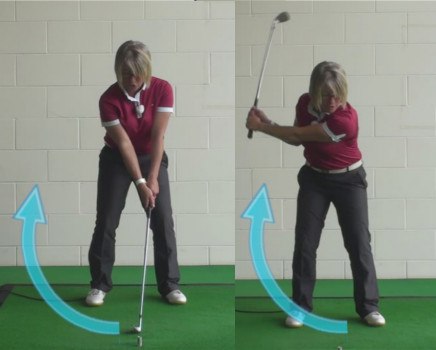In this golf tip we are going to look at how to stop chipping yips. There is a no more demoralising shot than an easy chip that you completely mess up. A chipping yip is a conditioned response to react in a certain way to a particular chip shot or situation.
If you have the yips with your chipping, you will freeze over the ball and when you do finally move the club away, it will be a really jerky movement.
The yips is a golf version of Pavlov’s dogs scenario. Pavlov was a Russian scientist in the 1800’s and whilst conducting a study on digestion, he conditioned the dogs he was studying to salivate when they heard a bell. In his study he sounded a bell before feeding the dogs. Initially, the dogs would only salivate when the food was presented. However, once the dogs became conditioned to this procedure, they salivated when they heard the bell.
If you have the chipping yips, you have unknowingly conditioned yourself in a similar way. You have subconsciously conditioned yourself to react to a particular shot or situation in a particular way, just as the dogs had a reaction when they heard the bell.

The difference is you have conditioned yourself with a 'fight or flight' response.Your brain’s neurons start firing, your muscles tighten, your breathing gets faster and shallower and your adrenaline can surge. All this happens within seconds and with little or no conscious response.
The yips, or a conditioned response, occur in your chipping when you have:
With all three of these ingredients present, you will develop the chipping yips. Now we know that the yips is a conditioned response in you, we can begin to recondition this response with the following four steps.
Initially, you need to change your attitude towards chipping. You need to alter your approach and begin to view chipping as a challenge rather than a problem. You need to stop dreading every time you are faced with a chip. Stop expecting the worst possible outcome and stop fearing being embarrassed. You need to work on improving your self talk towards your chipping and look forward to the opportunity to recondition yourself. You may not be able to control the outcome of your chip, but you can control your relaxation and your pre-shot routine to execute the chip.
When faced with the situation of having to chip, tell yourself you are looking forward to the opportunity to recondition yourself and improve your chipping. Once you have done this, work on relaxing, breathe deeply, loosen your muscles, count your steps to the ball, hum a tune. Do whatever you need to do to take your mind off chipping and reverse your 'fight or flight' response.
Once you have relaxed, use a definite pre-shot routine. Fully commit to the club, the shot and the target. Visualize exactly what you want the ball to do and then focus on your tempo.
Finally, learn to judge how well you followed the process, not the outcome. When working on curing the chipping yips, judge the chip not on where the ball goes, but on how well you followed the three previous steps of your attitude towards the shot, relaxing and following your pre-shot routine.
If you would like a great drill to help recondition your response further and to get you focusing on your rhythm and stroke rather than worrying about the ball and the outcome, try the following. Place 10 tee pegs low into the ground. Leave the first four tees free and then alternate balls on the other six. Set up to the first tee and work on clipping it out of the ground. Immediately set up to tee 2 and do the same again.
Continue to do this, working on you keeping a good tempo to your movement. Keep doing this until you have clipped all 10 tees from the ground, even the ones with balls on. This drill will get you focusing on reacting to tempo rather than thinking about outcome.
It will help recondition your response and within two months if you work hard and follow the four steps above as well, your yips will be cured.






